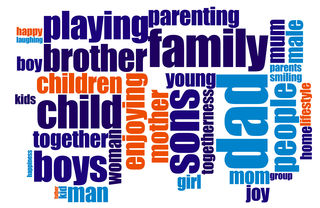Relationships
10 Things to Know About Parent-Child Relationships
The parent-child relationship is different from all others.
Posted April 10, 2016 Reviewed by Jessica Schrader
" ... the mother and child reunion, is only a motion away.” — Paul Simon

Paul Simon was right about the mother and child reunion being a very close bond. The parent-child relationship is qualitatively different than all of our other relationships. Dr. Keith Crnic, professor and chairman of the psychology department at Arizona State University, has extensively studied this relationship for most of his career. His lab has looked at how the nature of stress in parent-child relationships influences child and family function. He has also used longitudinal studies to look at the association between parenting styles and children’s emotions and behaviors that may contribute to early mental health issues in children.
Parent-child relationships develop over time, influenced by child characteristics, parent characteristics, and the contexts in which families operate. These factors mix together in unique ways to create incredible diversity in the qualities of those relationships.

We know that our role as parents is a critical one, in terms of child development. But what exactly can we and should we be doing to raise mentally healthy children or at the very least, to minimize the impact of mental disorders? Obviously, the answer is complex. Here are a few tips from Dr. Crnic’s research.
1) There are great benefits of effective parenting to child development under normal circumstances, and even greater benefits in the face of risk. There are certain risk factors that are unique to parent-child relationships. The relationship processes involved may depend on where the risk resides … in the child (e.g. developmental disability, prematurity, behavior problems), the parent (e.g. psychopathology), or the family context (e.g. economic hardship, minority status). Child developmental delay, child diagnosis of ADHD/ODD, and low family income are associated with lower positive parenting scores, a measure of a “resilient parent.” Maternal education acts as a protective buffer to improve resilient parenting for younger children (aged 3-5) while maternal health is protective for 5-year-olds. One of the greatest protective factors is maternal optimism, which is effective for children ages 3 to 8.
2) Children with developmental delays are more likely to have behavioral issues. The extent of a child’s behavior problems is a strong contributor to parenting stress, more so than the child’s cognitive delay.
3) Parental warmth and control, in a positive way, are the two most important parental attributes that help to create positive effects. In research terms, this is parental affect and sensitivity. Positive emotional reactivity and self-regulation are important parental factors in developing healthy children’s temperament.
4) Mothers and fathers share some childrearing attributes and effects, but also differ in important ways that create unique relationship qualities. Both mothers and fathers of children with borderline intellectual functioning have more negative controlling parenting (child age 5-6) than did parents of typically developing children. In turn, those children with borderline intellectual functioning showed more difficult behavior. It is interesting that negative paternal behavior is predicted by earlier child behavior while negative maternal behavior predicts child difficulties.

5) Emotion, in all its facets, plays an important role in the development and trajectory of parent-child relationships. It’s a two-way street; children’s emotions affecting parental behaviors and parental emotions affecting children’s development and behaviors. The regulation of emotion is especially critical in parent-child relationships, for parents as models, and for children as a core developmental competence.
6) Attunement is an important factor in parent-child relationships. This involves the dynamic and complex patterns of sensitive mutual understandings and interactions between children and their parents. Attunement is characterized by correspondences in biological, affective, cognitive, and behavioral domains. As Dr. Bornstein notes, “when interactions with caregivers fall out of attunement by becoming mistimed or mismatched, children and parents both experience distress."
7) One parent’s hostility might disrupt the other parent’s ability to maintain a positive relationship with his or her children. The father-child relationship appears to be especially vulnerable to parental hostility.
8) Stress is ubiquitous and reflected in many different contexts that can affect the quality of parent-child relationships. In particular, stress-effects associated with parenting (challenging child behavior and parenting tasks) may be greater than the effects of general life stress on families.
9) Maternal social factors and infant temperament can significantly influence the development of infant neurobiology. Maternal social factors may either promote or strain parent-infant adaptation over time. Prenatal psychosocial stressors significantly affect infant health and development. Prenatal maternal depression and lack of social support predicted higher cortisol among infants with more temperamental negativity. In addition, mothers with negatively temperamental infants were more likely to show maternal distress and less social support from prenatal to 12 weeks postpartum.
10) Father-son relationship is the most susceptible to crossover effects of parental hostility (affected by hostility from the other parent), while the father-daughter relationship seems to be more protected in the early years.
Here are Whitney Houston’s five tips for parenting, which is "The Greatest Love of All."
1) I believe the children are our future.
2) Teach them well and let them lead the way.
3) Show them all the beauty they possess inside.
4) Give them a sense of pride to make it easier.
5) Let the children's laughter remind us how we used to be.

Dr. Crnic’s extensive work has formed the foundation for this line of parent-child research. He will be stepping down as Chairman of the Psychology Department at Arizona State University at the end of this year and most likely retiring shortly thereafter. When asked how he will feel not being involved in psychology research, Dr. Crnic told me that even in retirement, he will continue to play a role and be involved in research activities as a professor emeritus.
Why has he spent his career studying the parent-child relationship? “Attempting to understand the nature and course of parent-child relationships is endlessly fascinating and endlessly challenging. This is all the more true when situations conspire to create unforeseen risks within families that demand whole new approaches to parenting processes. In our work, it’s all about understanding the mechanism of effect or the processes through which relationships develop.”
For more information, contact the Department of Psychology at Arizona State University.
Follow me on Twitter and on Instagram @Neil.Farber, or like my Facebook page, "The Key to Achieve." Visit my website here.
References
Ellingsen, et al. J. Intellectual development research, July, 2013. Ellingsen, et al. Research in developmental disabilities, April, 2014.
Baker, et al. Am J Mental Retardation. Dec, 2002.
Bates, et al Handbook of Temperament, Guilford Press, 2012.
Stevenson & Crnic, 2015; Crnic et al., 2009.
Fenning, et al. Journal of Family Psychology, April, 2014.
Coburn, Crnic & Ross Infant and Child Development, 24, 2015.
Journal of Child and Family Studies. July, 2014.




